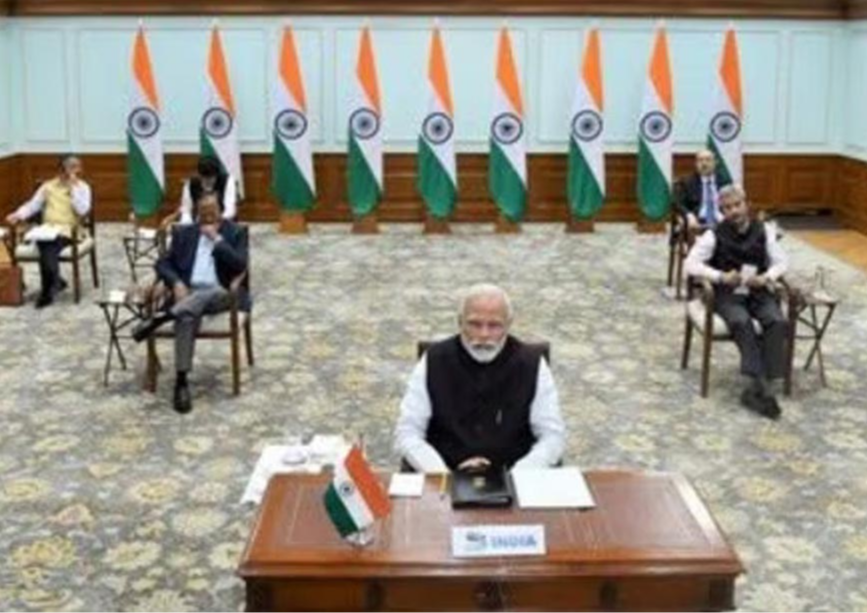-
CENTRES
Progammes & Centres
Location
As a rising India engages the world with confidence in an increasingly challenging environment, informed contestations on foreign policy should be the norm.

As India’s global imprint continues to grow, it has become difficult for political parties to ignore the external dimensions of the nation’s rise. It is reflected in the way both major political parties have outlined their foreign policy agenda in their manifestos.
Characteristically, the Bharatiya Janata Party (BJP) manifesto sees foreign policy as a tool to advance India’s civilisational legacy abroad. It promises to promote yoga, Ayurveda, and classical language training; restore heritage sites; and build a global Ramayana circuit. It positions India as a responsible stakeholder in global governance bodies, claiming the leadership mantle for the Global South. In contrast to the European populist parties’ parochial opposition to internationalism, the BJP’s confident nationalism partly gains its legitimacy from India’s status-seeking exercise as a rising power in the global arena.
To tackle the dovish image on national security, it promises to come up with a National Security Strategy and a National Economic Security Board.
In contrast, the Congress’s manifesto sees the Chinese incursion as a major national security setback. To tackle the dovish image on national security, it promises to come up with a National Security Strategy and a National Economic Security Board. After being left behind by the BJP in shaping higher defence reorganisation, the Congress is also keen to underscore democratic accountability for security policy by institutionalising the Chief of Defence Staff appointment and enacting parliamentary committee oversight over the National Security Advisor and the National Security Council. In a partisan snipe, though, its manifesto refers to a supposed consensus on foreign policy since Independence. The BJP government is held responsible for breaking away from this consensus in its Israel policy. This ignores India’s careful recalibration of its Israel/Gaza policy and suffers from amnesia on the PV Narasimha Rao government’s role in strengthening the India-Israel ties.
More substantively, this notion of foreign policy consensus elides the rich history of debates and contestation. While there is a grain of truth in the consensus narrative, the revisionist literature on the history of India’s foreign policy presents more nuanced and politically charged pathways to the making of foreign policy. Argumentative Indians have been debating the country’s approach to the world and have been at it for a while.
Beset with the material and psychological scars of colonial subjugation, the 19th century, when a national consciousness was developing, saw native thinkers grappling with India’s place in the world. They were concerned with justice and peace, the deleterious effects of imperial subjugation, defence spending priorities, and economic development, appropriate strategy in the Great Game, and the Khilafat question. India’s participation in World War II bitterly divided the nationalist leadership.
As India won Independence in the shadow of the bipolar great power contest, the issue of the diplomatic positioning of a nascent postcolonial Asian democracy gained salience. For many, the charismatic personality and keen personal interest of an avowedly internationalist Prime Minister meant a personalised and centralised approach to foreign policy: Jawaharlal Nehru’s vision and deft diplomacy served as the guidepost in this period. However, scrutiny of records reveals the involvement of a wide array of actors in foreign policy debates.
As India won Independence in the shadow of the bipolar great power contest, the issue of the diplomatic positioning of a nascent postcolonial Asian democracy gained salience.
The initial years of the Indian Republic were exemplified by the one-party domination of the Congress system. The Congress’s numerical advantage in Parliament would give the executive under Nehru a wide berth to implement his vision. Even though the Opposition was not in a strong position to shape the government policy and the notion of national interest warranted a degree of consensus, this did not prevent Opposition leaders from debating and critiquing foreign policy decisions. Remarkably for a polity conventionally characterised as lacking in ideological cleavages, these foreign policy debates were rooted in ideologically charged ways of looking at the post-World War II world order and India’s place therein.
Pro-Soviet Union in its tilt, the Communist Party of India (CPI) was initially suspicious of Nehru’s non-alignment; the CPI thought it was a cover for his preference for the Anglo-American bloc. India’s continued membership in the Commonwealth, Nehru’s visit to the United States (US), and his handling of the Korean War fuelled Communist suspicions, which were allayed in the mid-1950s following the exchange visits between Nehru and Soviet leaders. In a clear demonstration of an ideological tilt, even after the 1962 Sino-Indian border war, the CPI wanted resolution through peaceful means.
In stark contrast, C Rajagopalachari and Minoo Masani’s conservative Swatantra Party wanted to build an alliance of Asian democracies with the US backing against the “menace” of Chinese Communist aggression. Swatantra’s stance on nuclear weapons and Pakistan earned it the Jana Sangh’s criticism, though. The Hindu nationalists, by and large, favoured a stronger approach with calls for higher military spending, defence indigenisation, and the development of the nuclear bomb. The Jana Sangh, Swatantra Party, and various socialist parties also deviated from the official policy towards the recognition of Israel. Anti-Communist in their approach, the socialists also looked at China with apprehension and waged a moral campaign in favour of the Tibet cause.
The Hindu nationalists, by and large, favoured a stronger approach with calls for higher military spending, defence indigenisation, and the development of the nuclear bomb.
In the unipolar decades, India’s rise as a significant actor on the global stage was marked by a continuation of fractious debate and an illusory consensus. The extent of economic openness, tenets of nuclear doctrine, appropriate strategy towards China, alignment with the US, handling of cross-border terrorism, policy towards Afghanistan, and approach in global governance bodies have been issues where the Indian polity differed markedly.
While matters of foreign policy and national security are deemed too important to be considered partisan, there are good reasons for politics not to stop at the water’s edge. A nation’s position in anarchic international politics and the ruling elite’s perception of national interest considerations are too uncertain and dynamic variables not to be debated in a democratic setup. As a rising India engages the world with confidence in an increasingly challenging environment, informed contestations on foreign policy should be the norm.
This commentary originally appeared in Hindustan Times.
The views expressed above belong to the author(s). ORF research and analyses now available on Telegram! Click here to access our curated content — blogs, longforms and interviews.

Professor Harsh V. Pant is Vice President – Studies and Foreign Policy at Observer Research Foundation, New Delhi. He is a Professor of International Relations ...
Read More +
Sanjeet Kashyap is a PhD candidate in International Politics at Jawaharlal Nehru University, New Delhi. He has also interned with the Strategic Studies Programme, Observer ...
Read More +